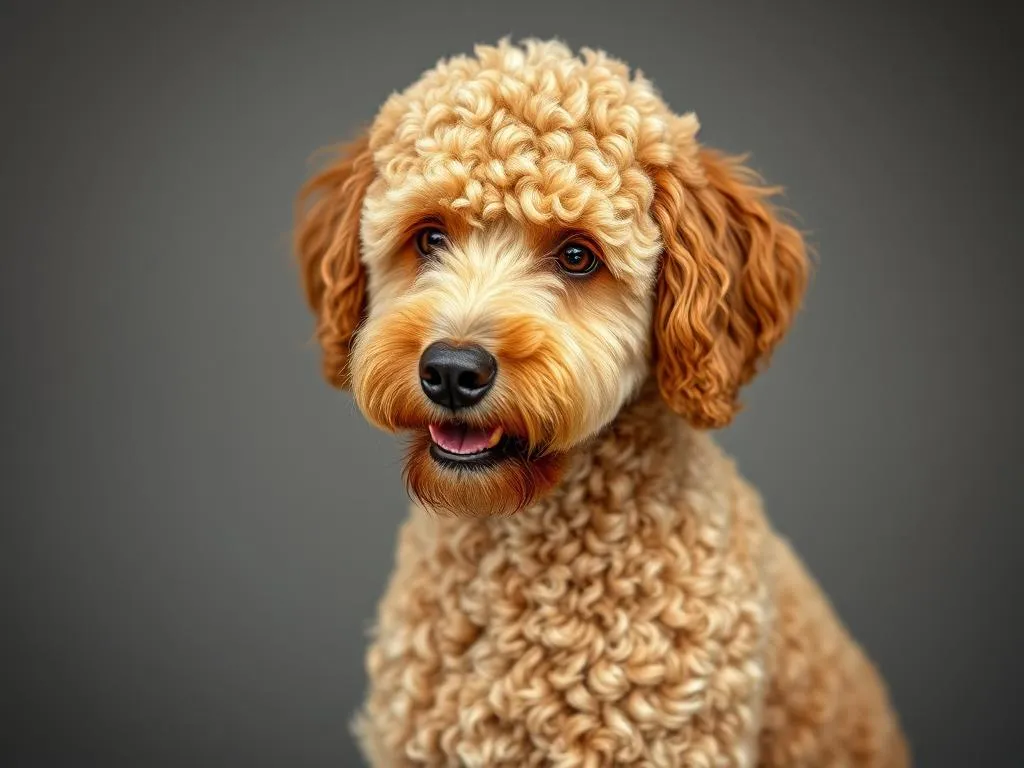
Introduction
Dog breeds play an essential role in our lives, offering companionship, protection, and unconditional love. Among the multitude of breeds available, hybrid breeds have surged in popularity, attracting dog lovers with their unique traits and characteristics. One such hybrid gaining attention is the Rhodesian Poodle Mix. This intriguing mix combines the athleticism of the Rhodesian Ridgeback with the intelligence and hypoallergenic coat of the Poodle, making it an appealing choice for many potential owners. Understanding the specifics of this hybrid breed is crucial for anyone considering bringing one into their home.
Understanding Hybrid Breeds
Definition of Hybrid Breeds
Hybrid breeds are the result of crossbreeding two different purebred dogs. These mixes can inherit traits from both parent breeds, which often leads to a diverse range of characteristics, including appearance, temperament, and health. Unlike purebreds, whose traits are relatively consistent, hybrid breeds may vary significantly within the same litter, making each dog unique.
Popularity of Hybrid Breeds
In recent years, the trend of dog ownership has shifted towards hybrid breeds, also known as designer dogs. This rising popularity can be attributed to several factors, including the desire for dogs that possess desirable traits from both parent breeds. Many prospective dog owners find that hybrid breeds can offer a healthier genetic profile and a blend of personalities that suit their lifestyles better than traditional purebreds.
Factors Influencing Hybrid Breeds
The genetic diversity present in hybrid breeds often results in enhanced health benefits, reducing the likelihood of inherited diseases common in some purebreds. Additionally, the variety in appearance and temperament allows potential owners to choose a dog that fits their specific preferences, whether they desire a playful companion or a more laid-back pet.
Overview of the Rhodesian Poodle Mix
Parent Breeds
Rhodesian Ridgeback
The Rhodesian Ridgeback originated in Southern Africa, initially bred for hunting lions and protecting livestock. This breed is known for its distinctive ridge of hair along its back, which grows in the opposite direction of the rest of the coat.
-
Physical Characteristics: Rhodesian Ridgebacks are large, muscular dogs with a short, dense coat that comes in various shades of wheaten. They typically weigh between 70 to 85 pounds and stand about 24 to 27 inches tall at the shoulder.
-
Temperament and Personality Traits: Known for their loyalty and protective nature, Ridgebacks are confident and courageous. They are great family dogs but require proper socialization and training to ensure they behave well around children and other pets.
Poodle
The Poodle is a versatile breed known for its intelligence and elegance. Poodles come in three sizes: standard, miniature, and toy, with the standard variety often used in hybrid breeding.
-
Physical Characteristics: Standard Poodles weigh between 40 to 70 pounds and stand about 15 inches or taller. They have a curly coat that is hypoallergenic, making them suitable for allergy sufferers. Their coat colors can range from black to white, apricot, and gray.
-
Temperament and Personality Traits: Poodles are highly intelligent, eager to please, and easily trainable. They thrive on mental stimulation and social interaction, making them excellent companions for active families.
Characteristics of the Rhodesian Poodle Mix
The Rhodesian Poodle Mix inherits a blend of traits from both parent breeds, resulting in a unique and appealing dog.
-
Physical Appearance: This hybrid can vary significantly in size and coat type, reflecting the traits of its parent breeds. Typically, they are medium to large-sized dogs, weighing between 50 to 80 pounds. Their coats can be wavy or curly, often coming in a variety of colors such as fawn, brown, or even a mix of shades.
-
Temperament and Behavioral Traits: The Rhodesian Poodle Mix is known for being intelligent, loyal, and affectionate. They often exhibit the playful nature of the Poodle combined with the protective instincts of the Ridgeback. This breed is great with children and can be friendly with other pets when properly socialized.
-
Common Health Concerns: Overall, the Rhodesian Poodle Mix can inherit health issues from either parent breed, such as hip dysplasia, skin allergies, and certain hereditary conditions. Regular veterinary check-ups and a healthy lifestyle can help mitigate these risks.
Care Requirements for Rhodesian Poodle Mix
Nutrition
Feeding your Rhodesian Poodle Mix a balanced diet is crucial for maintaining its health. A high-quality dog food that is rich in protein and low in fillers is recommended. Look for dog food that lists meat as the first ingredient and is appropriate for your dog’s age, size, and activity level.
-
Recommended Diet and Feeding Guidelines: Adult dogs typically require about 1,500 to 2,000 calories daily, depending on their size and activity level. It’s advisable to divide their meals into two separate feedings to help maintain energy levels throughout the day.
-
Common Dietary Issues and Solutions: Some Rhodesian Poodle Mixes may be prone to food allergies or sensitivities. If you notice symptoms such as itching or gastrointestinal upset, consult your veterinarian for advice on a suitable diet.
Grooming
The grooming needs of a Rhodesian Poodle Mix can vary significantly based on its coat type.
-
Coat Care and Grooming Frequency: If the dog inherits more Poodle-like fur, regular grooming is essential to prevent matting. Aim to brush your dog’s coat at least once a week, or more frequently if they have a curlier coat.
-
Bathing and Brushing Tips: Bathe your dog every 4 to 6 weeks or as needed, using a dog-specific shampoo. Regular brushing will help remove loose hair and dirt, keeping the coat healthy.
Exercise Needs
Both parent breeds are active, so the Rhodesian Poodle Mix requires regular exercise to stay healthy and happy.
-
Daily Exercise Requirements: Aim for at least 60 minutes of physical activity each day, which can include walks, playtime, and interactive games.
-
Suitable Activities for the Breed: This hybrid enjoys a variety of activities, such as running, swimming, and participating in dog sports like agility training. Engaging in mentally stimulating tasks will also help keep their minds sharp.
Training
Training your Rhodesian Poodle Mix is vital for ensuring good behavior and socialization.
-
Importance of Early Socialization: Expose your puppy to various environments, people, and other animals early on to cultivate a well-adjusted dog.
-
Effective Training Methods and Techniques: Positive reinforcement methods work best with this intelligent breed. Use treats, praise, and playtime as rewards to encourage good behavior. Consistency and patience are key to successful training.
Living with a Rhodesian Poodle Mix
Ideal Living Conditions
The Rhodesian Poodle Mix adapts well to different living conditions, but certain factors should be considered.
-
Space Requirements: While they can live in apartments, having access to a yard is beneficial. A home with ample space to roam and play is ideal.
-
Best Environments: These hybrids can thrive in both urban and rural settings as long as they receive sufficient exercise and mental stimulation.
Compatibility with Families and Other Pets
The Rhodesian Poodle Mix generally gets along well with families and other pets.
-
Suitability for Families with Children: Their playful and affectionate nature makes them great companions for children. However, supervision is essential, especially with younger kids.
-
Interaction with Other Pets and Animals: Early socialization can help them coexist peacefully with other pets. Some may exhibit a strong prey drive due to their Ridgeback lineage, so introducing them to smaller animals should be done cautiously.
Behavioral Traits
Understanding common behavioral traits will help in managing your Rhodesian Poodle Mix.
-
Common Behavioral Issues: Potential issues may include separation anxiety, boredom, and stubbornness. Providing adequate exercise and mental engagement can mitigate these behaviors.
-
Solutions and Prevention Strategies: Establishing a consistent routine and providing training can help address behavioral challenges. Engage your dog with toys, puzzles, and activities that stimulate their mind.
Health Considerations
Common Health Issues
The Rhodesian Poodle Mix may face several health concerns, often inherited from their parent breeds.
-
List of Potential Health Problems: Common issues include hip dysplasia, allergies, eye conditions, and skin problems. Regular vet visits are crucial for early detection and treatment.
-
Importance of Regular Vet Check-ups: Routine check-ups can help monitor your dog’s health and allow for timely vaccinations and screenings.
Preventative Care
Preventative care is essential for maintaining your Rhodesian Poodle Mix’s health.
-
Vaccination Schedules: Follow your veterinarian’s vaccination schedule to protect your dog from common diseases.
-
Routine Health Screenings: Regular screenings can help catch potential health issues early, ensuring your dog leads a healthy life.
Finding a Rhodesian Poodle Mix
Reputable Breeders
If you decide to purchase a Rhodesian Poodle Mix, finding a responsible breeder is crucial.
-
How to Identify a Responsible Breeder: Look for breeders who prioritize health testing and socialization. A good breeder will willingly provide health clearances and allow you to meet the puppy’s parents.
-
Questions to Ask Breeders: Inquire about the puppy’s lineage, health history, and any socialization efforts made before sale.
Adoption Options
Adopting a Rhodesian Poodle Mix can be a fulfilling option.
-
Benefits of Adopting from Shelters or Rescues: Adoption provides a loving home to a dog in need and often comes at a lower cost than purchasing a puppy from a breeder.
-
How to Find a Rhodesian Poodle Mix for Adoption: Check local shelters, rescue organizations, and online adoption platforms. Networking within dog communities can also lead to potential adoption opportunities.
Conclusion
The Rhodesian Poodle Mix is a fantastic hybrid breed that combines the best traits of its parent breeds. With proper care, training, and attention, this dog can be a loyal and loving companion. Potential owners are encouraged to consider their lifestyle and preferences when choosing a breed, ensuring a perfect match for their home and family. Understanding the unique characteristics and care requirements of the Rhodesian Poodle Mix will help you provide the best life for your new furry friend.









